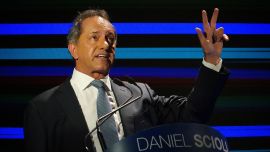Russia signalled Friday it may dial back its war aims to focus on eastern Ukraine after failing to break the nation's resistance in a month of fighting and attacks on civilians, including bombing a crowded theatre where officials now say up to 300 people died.
The possible shift came as US President Joe Biden, fresh from a series of Western summits in Brussels, visited elite US troops serving with NATO just across the border in Poland.
President Vladimir Putin initially ordered the invasion to destroy Ukraine's military and topple pro-Western President Volodymyr Zelensky, bringing the country under Russia's sway.
However, Sergei Rudskoi, chief of the Main Operational Directorate of the General Staff of Russia's Armed Forces, on Friday suggested a considerably scaled-back "main goal" of controlling the Donbas, an eastern Ukrainian region already partly held by Russian proxies.
Rudskoi made no reference to widespread signs of setbacks for his troops, claiming instead that he considers the initial phase of the invasion to have been a success.
Biden earlier praised the "incredible" Ukrainian resistance, comparing the conflict to a bigger version of communist China's 1989 crushing of protests in Tiananmen Square.
The US leader announced new measures to help the European Union shed dependence on imported Russian energy – part of a sea change in the West, which for years has shrunk from direct confrontation with the Kremlin, but now seeks to make Putin a pariah.
Biden told soldiers from the 82nd Airborne Division that the struggle in eastern Europe represents a historic "inflection point."
"Are democracies going to prevail..., or are autocracies going to prevail? And that's really what's at stake," Biden said.
While in Rzeszow, about 50 miles (80 kilometres) from Ukraine, Biden was briefed on the humanitarian situation, with more than 3.7 million refugees fleeing Ukraine, most of them into Poland.
Mariupol theatre bombing
Russia's far bigger military continued to combat determined Ukrainian defenders using Western-supplied weapons, from near the capital Kyiv to Kharkiv, the Donbas region and the devastated southern port city of Mariupol.
Authorities said they fear some 300 civilians in Mariupol may have died in a Russian air strike on a theater being used as a bomb shelter last week. The theatre was targeted despite the word "children" being written in large Russian letters on the ground outside, so as to be visible to pilots.
Russian forces hammering Mariupol's out-gunned defenders consider the city a lynchpin in their attempt to create a land corridor between the Crimea region Moscow already seized in 2014 and the Donbas.
Leaving behind a home that has become a hellscape, Osksana Vynokurova, 33, counted the cost.
"I have escaped, but I have lost all my family. I have lost my house. I am desperate," she told AFP after escaping Mariupol by train to the western city of Lviv. "My mum is dead. I left my mother in the yard like a dog, because everybody's shooting."
Also disembarking from the train, Svetlana Kuznetsova said: "There is no water, light and electricity. We were living in cellars. We were cooking food on fires.
"I have never seen such horror. There is no Mariupol," the middle-aged woman added, comparing her city to Grozny, the capital of Chechnya that Russian forces obliterated during wars in the 1990s. "Everything is destroyed."
Eastern focus?
Russia's Army was predicted by some to roll across Ukraine with little resistance. However, Putin's military has been beset by many of the same problems plaguing its ranks as far back as the Chechen wars – poor discipline and morale, faulty equipment and tactics, and brutality toward civilians.
Amid heavy censorship, Russian authorities Friday gave only their second official military death toll since the start, at 1,351. This is far below Western estimates, with one senior NATO official saying between 7,000 and 15,000 Russian soldiers have died.
Rudskoi's announcement of a pivot to the battle for eastern Ukraine was accompanied by claims of success. He said Ukraine's military has been severely degraded and that the reason Russia had not seized cities was to "prevent destruction and minimise losses among personnel and civilians."
His reference to plans for a "liberation" of the Donbas region could now lay the groundwork for the Kremlin to focus on an easier campaign that can be sold to Russians as a victory. However, Ukrainians are mounting an increasingly aggressive defence and in places even taking back ground.
Britain's Ministry of Defence said Ukrainian counter-attacks, and Russian forces falling back on overextended supply lines, had allowed Ukraine to "re-occupy towns and defensive positions up to 35 kilometres (22 miles) east of Kyiv."
A Pentagon official said Ukrainian forces were also attempting to recapture Kherson, so far the only major city held by Russian invasion troops.
Chemical weapons warning
As the Russian war machine stumbles, Western officials are warning Putin could resort to more extreme measures, including chemical weapons.
In Brussels on Thursday for NATO, EU and G7 summits, Biden said the NATO alliance would "respond" if Putin does use chemical warfare – though his National Security Adviser Jake Sullivan later stressed the United States itself "has no intention of using chemical weapons, period, under any circumstance."
Kremlin spokesman Dmitry Peskov accused Biden of seeking to "divert attention."
Putin, whom Biden again branded a "war criminal," gave a speech Friday saying that Russia was the victim, comparing Western boycotts to "Nazis in Germany."
Energy strategy
Earlier Friday, Biden and EU commission chief Ursula von der Leyen announced a joint energy task force seeking to map a way for Europe to break its energy dependence on Russia.
Germany, Moscow's biggest customer in Europe, said it would halve Russian oil imports by June and end all coal deliveries by the autumn.
The effort to reorientate Europe's energy supplies will take time and, together with sweeping sanctions aimed at isolating Russia's currency and industries, is already inflicting shocks on Western economies.
However, von der Leyen said the campaign is working, and "draining Putin's resources to finance this atrocious war."
Birthday on a bus
According to the United Nations, more than half of Ukrainian children have been driven from their homes – "a grim milestone that could have lasting consequences for generations to come", according to Unicef chief Catherine Russell.
The UN children's agency Unicef said Thursday that 4.3 million children – more than half of Ukraine's estimated 7.5 million child population – had been forced to leave their homes. It puts at some 1.5 million the number of those children who have become refugees, while another 2.5 million are displaced inside their war-ravaged country, it said.
In the frontline town of Irpin on Kyiv's outskirts, Daria played with her dinosaur mittens as an evacuation bus took her family and others away. It was her fourth birthday on Thursday.
"We were planning some candles and a cake, but we had to leave it there," said Daria's mother Susanna Sopelnikova, 29, holding her tightly on her lap.
"We stayed in the basement for about three weeks, then we decided to leave," Sopelnikova said, to the distant boom of shelling.
Some 3.7 million people have fled Ukraine since Russia's invasion a month ago, the United Nations said Friday.
The UN refugee agency, UNHCR, said 3,725,806 Ukrainians had fled the country – an increase of 50,854 from the previous day's figure. Around 90 percent of them are women and children, it added.
Of those who have left, 2.2 million have fled for neighbouring Poland while more than half a million have made it to Romania. Around 20,000 have gone to Russia.
Before the crisis sparked a month ago, EU member Poland was home to around 1.5 million Ukrainians.
In total, more than 10 million people – over a quarter of the population in regions under government control before the February 24 invasion – are now thought to have fled their homes, including nearly 6.5 million who are internally displaced.
Ukraine's refugee crisis is Europe's worst since World War II.
– TIMES/AFP























Comments